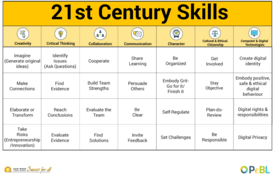Critical Thinking Guidebook - K-5 (Elementary) Sun West
Critical Thinking Elementary K-5
Purpose
Why is this important?
Critical thinking is a key 21st Century skill that students need to embody in order to successfully ask questions before seeking and evaluating answers in order to reach creative solutions. Having the skills and abilities to identify issues, find evidence, reach conclusions, and evaluate evidence, allows students to be successful participants in the planning of their learning and assessment.
Key Steps in Teaching Critical Thinking Strategies:
1. Isolate the skill needed to be taught.
2. Provide students with direct teaching to learn strategies and practice self-awareness.
3. Provide and allow opportunities for students to practice the skills and strategies, and reflect often. This takes time at first, but students are rewarded for their efforts once they are able to master their practiced skill.
4. Revisit strategies and skills often.
Explicit Teaching
To be able to learn and grow in 21st Century Competency understanding, it is important to teach each skill and let students experience what each skill looks like as well as how you can grow in each area. Caution: by simply saying the word "communication or collaboration...etc" students may not get a full understanding of each skill. Explicitly teaching and utilizing skills in different ways is what will ultimately promote deep understanding and growth in 21st Century Competencies.
Timeline Suggestions for Explicit Teaching
The document below provides a year plan to teach each of the 21st century skills. It is beneficial to have an explicit teaching plan to ensure each skill is taught; however skills should also be reinforced as much as possible throughout class time.
Link: 21st Century Skills Year Plan
Lesson Plan Ideas
Video: What is Critical Thinking (Gr.2-4)
Video: Episode 1.1: Introduction to Critical Thinking (Gr. 3-6)
Video: 5 tips to improve your critical thinking (Gr.5+)
Video: Critical Thinking for Children- Introduction
Video: Critical Thinking for Children - Three Kinds of Thinkers
Identify Issues (Ask Questions)
Research Skills Document: The following is a resource for teaching research skills to younger learners. It looks at teaching them:
- How to ask a question
- How to search for information
- How to evaluate resources
- How to take notes
- How to share your learning
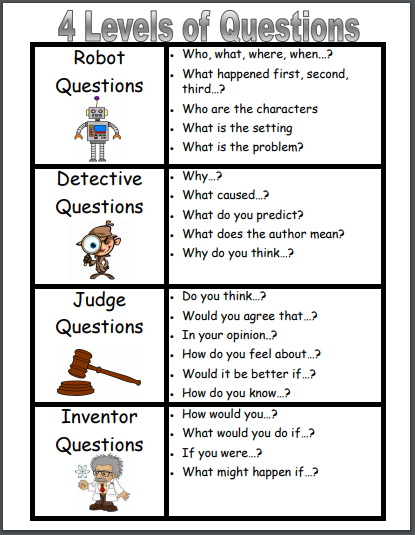
4 Levels of Questions
| Sesame Street: I Wonder | https://www.youtube.com/watch?v=XwAd8QZb9Ok |
| The Importance of Asking Good Questions | https://www.youtube.com/watch?v=kFVcpzSHuDw |
| Questions Start with These (Song) | https://www.youtube.com/watch?v=Ecdm0A71fpA |
| Asking Scientific Questions | https://www.youtube.com/watch?v=bqfQpURDoCo |
| The Power of Effective Questions | https://www.youtube.com/watch?v=1dO0dO__wmE |
| Defining a Problem: Crash Course Kids 18.1 | https://www.youtube.com/watch?v=OyTEfLaRn98 |
| Defining Success: Crash Course Kids 18.2 | https://www.youtube.com/watch?v=XyFUqFQfl30 |
| Episode 5.1 Identifying and Defining Problems | https://www.youtube.com/watch?v=2m-xgti19-U |
Find Evidence
| How to Build Online Student Research Skills | https://www.madlylearning.com/studentresearch/ |
| 5 Tips for Successful Research Projects | https://www.classroomtestedresources.com/2016/03/5-tips-for-successful-research-projects.html |
| Using a Picture Book to Guide Research | http://resourcebank.ca/courses/looking-at-landmarks-using-a-picture-book-to-guide-research/view |
Reach Conclusions
| Making Tough Choices with Kid President | https://www.youtube.com/watch?v=gdsCUExLE-Y |
| Decisions Can Be HARD! | FUZZABOOM (Kids Puppet Show) |
https://www.youtube.com/watch?v=0NpQronsFic |
| Decision Making |
https://www.youtube.com/watch?v=MYvZ31IImtk |
Evaluate Evidence
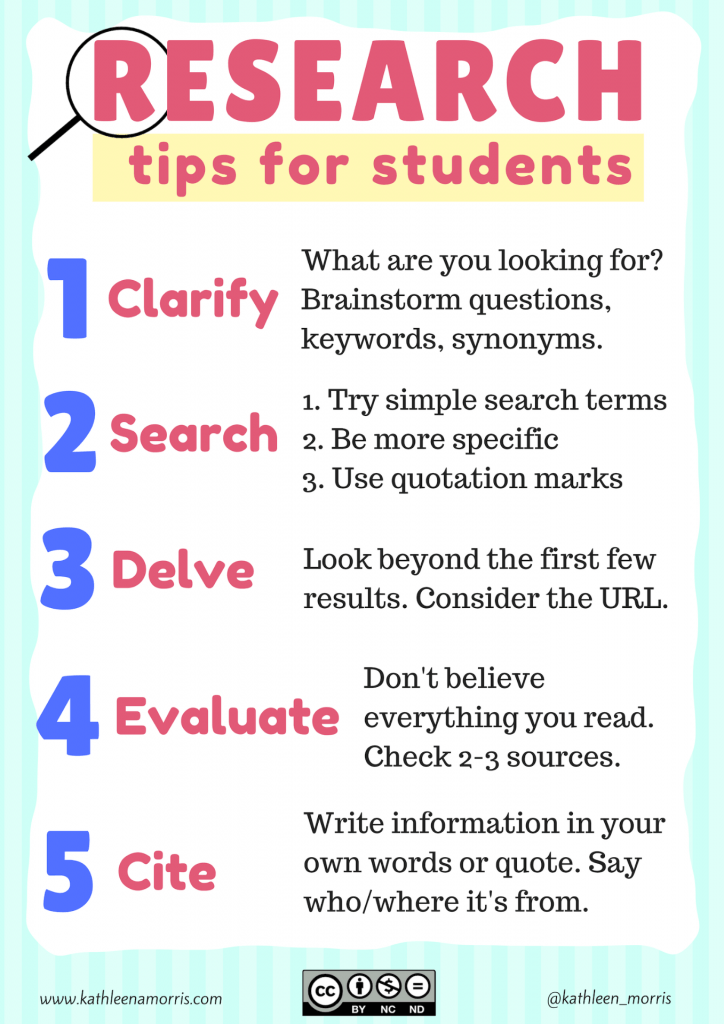
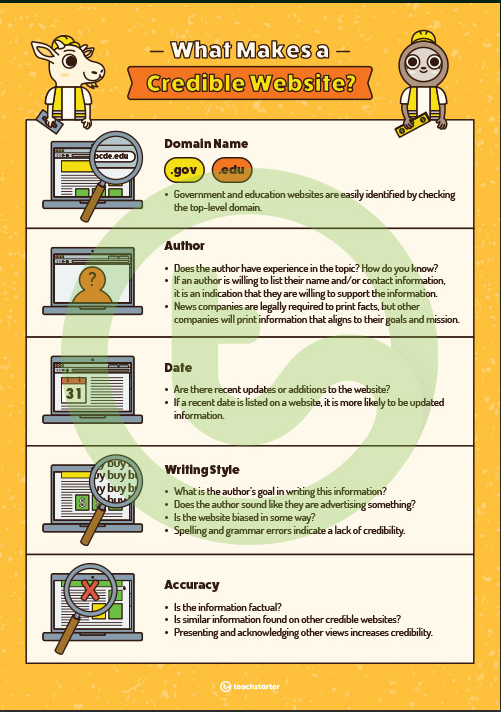
Credible Website
5 Tips for Teaching Students How to Research and Filter Information
Effective Online Research Skill Review (including how to evaluate a website)
Video: How to Evaluate Sources for Reliability
Critical Evaluation of Information - surveys, resources, lesson plans, etc
Using the "Tree Octopus" to teach students to evaluate websites
Using the "House Hippo" video to teach students to evaluate resources
Integration of Skills
Intentional integration of 21st Century Competency language in all day-to-day activities supports the development of routine reflection, skill use, and growth in support of curricular knowledge acquisition.
Why?
If we do not intentionally integrate 21st Century Competency connections into our learning environments, it is easy to forget about them. As the language becomes routine, growth in skills can and should be explored regularly. Ultimately the 21st Century Competencies are the skills needed to be successful in all day-to-day activities as well as future career opportunities. By being intentional in integrating the language and skill use in all aspects of learning, understanding of the skills can be applied and reflected upon to look for areas of potential growth and application.
How?
Once skills have been explicitly taught, integration of 21st Century Competencies can be achieved by connecting skills to all curricular areas, participating in pre-and post reflections (allowing students to predict which skills will be needed and subsequently which skills need to be worked on) and the use of 21st Century Competency rubrics to track growth. Example: by using learner profile data, students can reflect on which skills they need to employ for a particular activity and based on this information, choose group members that have strengths or challenges in those skill areas.
Examples
When integrating 21 Century Competency language in all areas of learning consider the following curricular connected resources. As you use similar resources in your own learning environment, how can you relate them back to growth and understanding of the 21 Century Competencies?
In ELA
Video: Teaching Critical Thinking to Kindergartens (GrK-2) (Lesson idea for teaching critical thinking during story time.)
Video: Grade 1-3 Critical Thinking Continuum
ELA BDA Questions:
| Before Reading | I wonder what the story is about? Does the title help? What Schema do I have? What prediction can I make? Is this book fiction or nonfiction? Will I learn something? |
| During Reading | I wonder what will happen? Do I need to reread? Am I making a movie in my mind? what is the story mainly about? |
| After Reading | Is my prediction correct? Do I need to read it again? Did I learn something new? What is my connection? Can I give a detailed retell? |
Videos to Support BDA Questions while Reading & Writing:
Link: 6 Questions for Reading & Writing Video
Link: Asking and Answering Questions: Reading Literature Video
Link: Learning Asking and Answering Questions Instructional Video
In Math
Number Talks By Sherry Parrish
Number Talks Resources:
Link: Number Talks on Amazon
Link: mathforlove.com
Link: brownbagteacher.com
Math Games to Encourage Asking Questions
Teachable moments
Whenever a question, situation, comment or activity that involves a connection to a 21 Century Competency arises, take a moment to talk to students about it. Discussing skills, how they integrate into everything you do in life makes the reflection on the importance of skills a habit. This habit will instill a growth mindset around developing skills to their fullest potential. Teachable moments can be as short as 20 seconds. Make it your habit and it will become theirs!
Tracking Growth
When considering 21st Century Competency application, it is essential for both the teacher and the student to track growth. There is clear potential for growth in skill use throughout our lives. To ensure growth and understanding of application is taking place, we can easily track progression using rubrics, checklists, and self-assessments.
Formative Assessment
Formative assessments of 21st Century Competencies include anecdotal documentation, self-assessments and rubric check-ins. These formative assessments provide snapshots of growth throughout the learning process and allow goal setting to take place.
See below for Self-Reflection and Goal Setting Documents: (rename below)
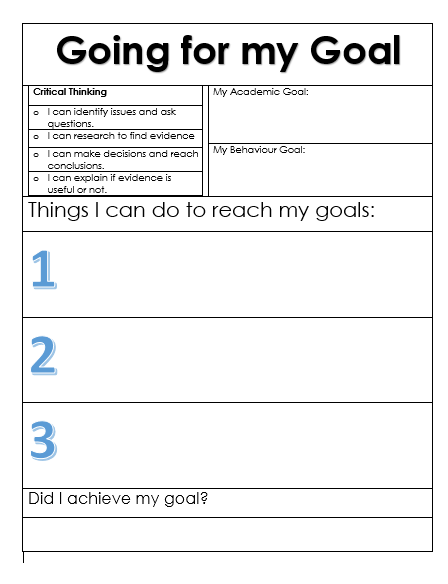
Goals
Assessing Growth
Link: Reflection Documents
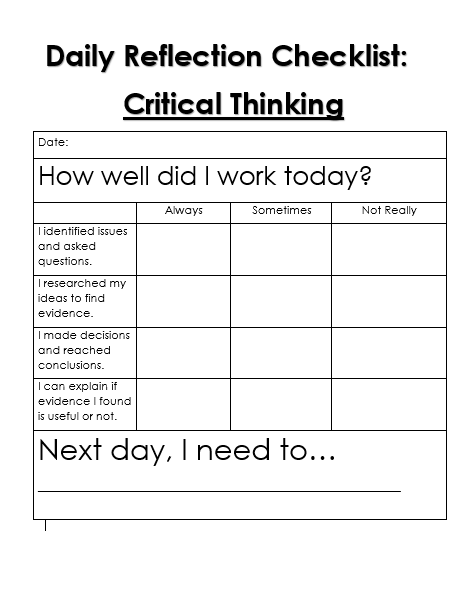
Daily Reflection Checklist
Summative Assessment
Exemplar Rubrics K-5
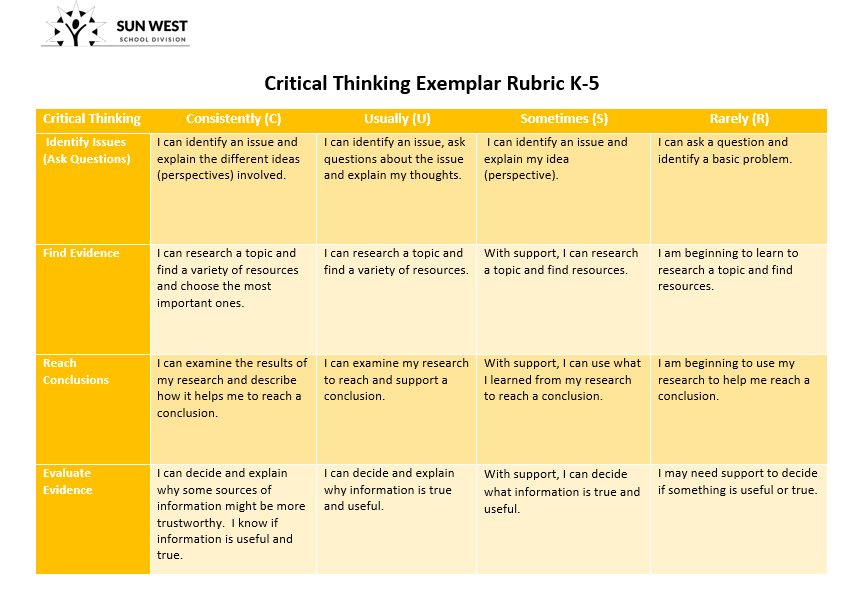
Critical Thinking K-5
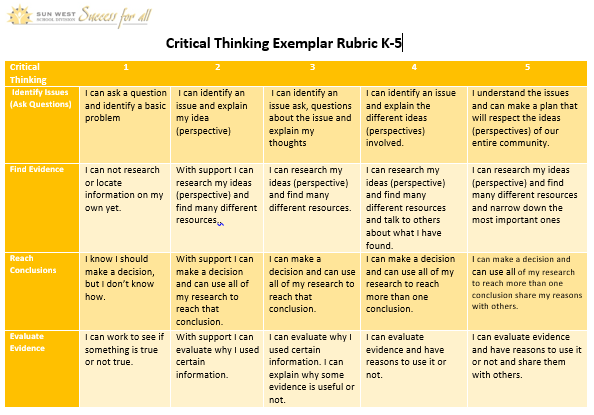
Critical Thinking Exemplar Rubric K-5
Co-creating Rubrics
Exemplar rubrics have been developed for K-5, 6-9 and 10-12. To connect fully with students in their understanding of skill application and growth, a recommendation would be to re-write the rubric with the students to include their understanding of the skill, goals for integration in learning and commitment to the skill development.
Resources
Internet Research Guidelines Resource
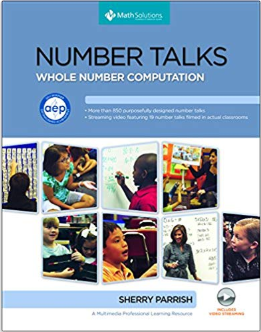
Number Talks by Sherry Parrish
Link: Sun West Resource Bank Critical Thinking Resources
Print based
Children's Books That Promote Critical Thinking
- More-Igami – Dori Kleber
- The Most Magnificent Thing – Ashley Spires
- What To Do With a Box?– Jane Yolen
- What Do You Do With An Idea? – Kobi Yamada
- Your Fantastic, Elastic Brain – JoAnn Deak
- The Thingamabob – Il Sung Na
- Rosie Revere, Engineer – Andrea Beaty
- Shh! We Have A Plan! – Chris Haughton
The Student's Guide to Internet Research
Videos
| Identify Issues | ||
| Find Evidence | How to Write a Research Paper for Kids | https://www.youtube.com/watch?v=h5HM8GjQwP8&list=PLi_G3Qy6WDWUqrzsTqZCq3iGlJ2MO0aXb |
| Taking Notes for Research in Elementary | https://www.youtube.com/watch?v=Q3S1chdLhhw | |
| Reach Conclusions | Making Tough Choices with Kid President | https://www.youtube.com/watch?v=gdsCUExLE-Y |
| Decisions Can Be HARD! | FUZZABOOM (Kids Puppet Show) |
https://www.youtube.com/watch?v=0NpQronsFic |
|
| Decision Making |
https://www.youtube.com/watch?v=MYvZ31IImtk |
|
| Evaluate Evidence |
Interactive
Interactive Apps: Minecraft, Blockearth, Animate Me: For kids, Block Craft 3D: City Builder Simulator, The Sims, Township,
Educational Tools, Videos & Online Games:
Link: Whoo's Reading
Link: Newsela
Link: NeoK12
Link: Puzzle Maker
Educational Articles
Link: Nature & Thrive
Link: The Foundation for Critical Thinking
Link: Skills You Need
Websites
| Various Critical Thinking Activities | http://eyesonheaven.net/12-ways-foster-critical-thinking-skills-home/#.U1k1hfmSySo |
